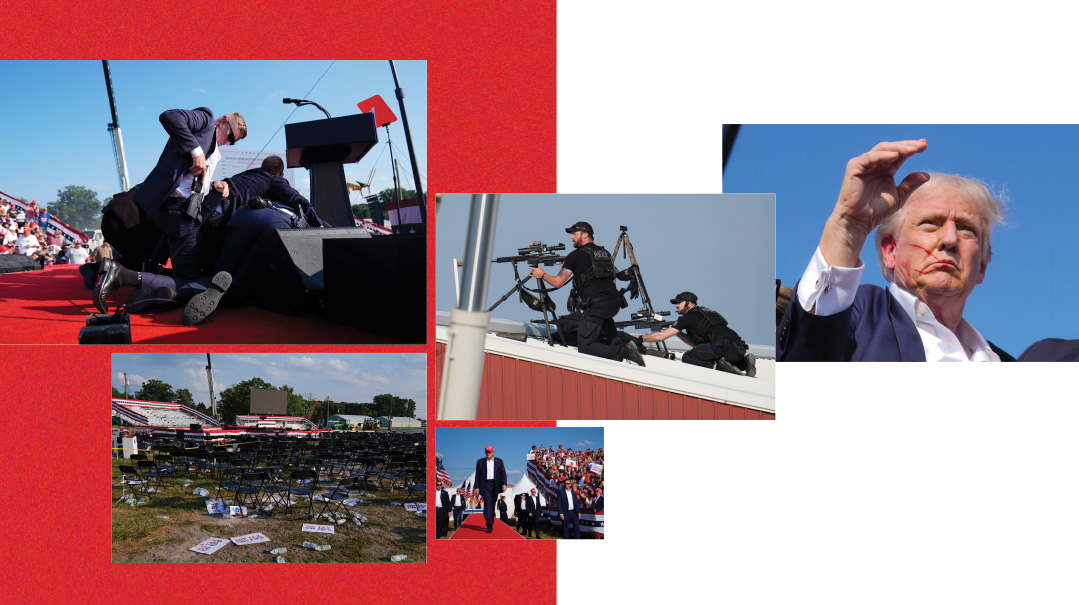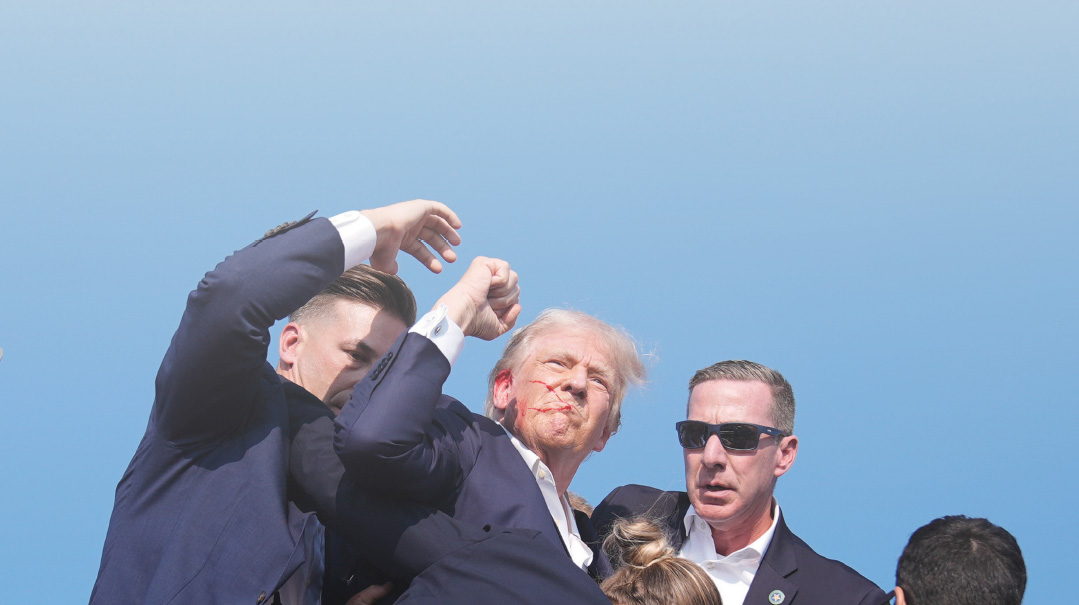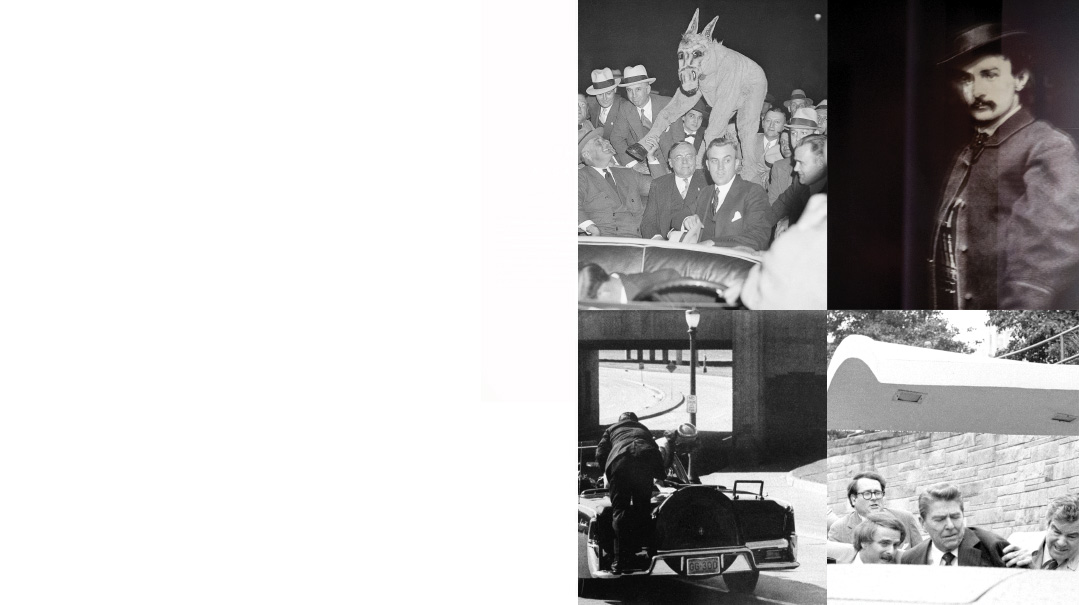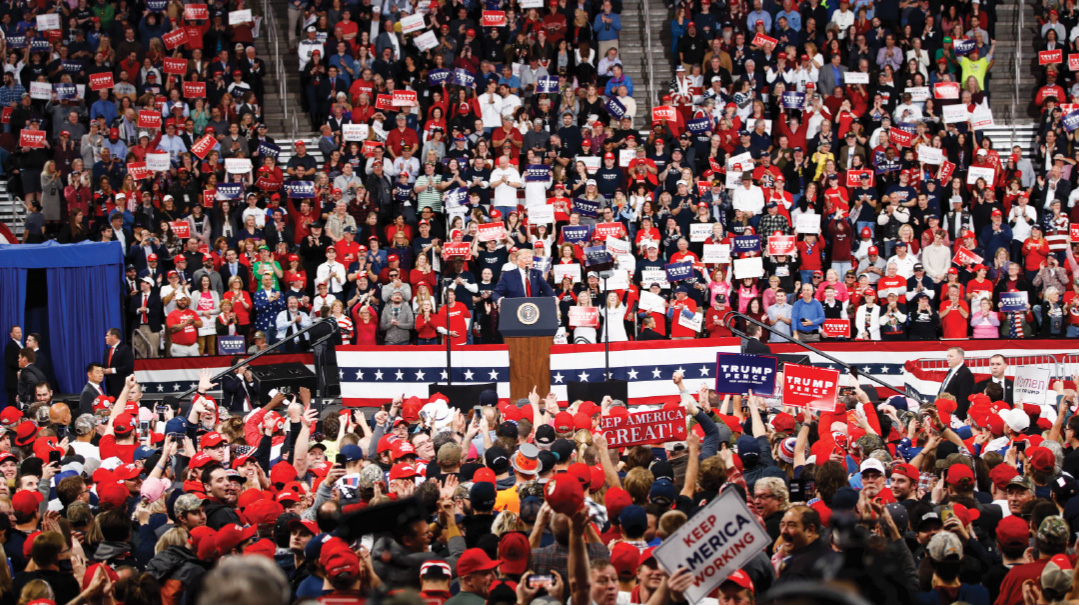The Return of Trump: What Doesn’t Kill

Shaken, defiant, and now professing unity, Donald Trump takes center stage again

Photos: AP Images
Separated from death by millimeters in an act of what he recognized as Divine Providence, the former president looks unstoppable — especially against Democratic paralysis. Shaken, defiant, and now professing unity, Donald Trump takes center stage again.
When a lone-wolf assassin pulled the trigger at Donald Trump’s televised rally in Pennsylvania this week, the shots were literally heard around the world. The failed hit might well have upended the 2024 race.
It’s an image that’s already iconic.
Like the Marines raising the flag on Iwo Jima, or the Twin Towers aflame, the picture of Donald Trump in the seconds after surviving the attempt on his life this week is now branded into the world’s memory. The granite-jawed president, streaming blood, pumping his fist defiantly as he towers above his Secret Service agents with the Stars and Stripes soaring overhead — it’s an image of Hollywood-esque power and was recognized as such immediately. “Trump’s Raised Fist Will Make History — and Define His Candidacy,” was Politico’s headline.
Even amid the heat and drama of the Trumpian political age, the first shooting of a presidential candidate since 1981 was shocking. Many politicians and commentators are resorting to faith to explain events — not least Trump himself.
“It was G-d alone who prevented the unthinkable from happening,” he wrote on Sunday.
In that at least, it was a heartening display of America’s religious exceptionalism — one that would have been unthinkable in much of secular Europe.
There was also a surreal edge to the violence: a president shot while the crowd behind him waved “Biden, You’re Fired” signs. A made-for-TV moment by a made-by-TV president.
The shockwave running through America and beyond as the footage of gunman Thomas Crooks’s assassination attempt circulated was palpable. Politics as normal halted, as Biden called Trump and both Democrats and Republicans paused their campaign attacks. Americans of all kinds reeled in shock at the first assassination attempt on a president in decades.
As law enforcement scrambled to unravel the would-be killer’s background and motives, and world leaders expressed their solidarity with the former president, a series of insta-narratives took hold. The campaign was as good as over, and Trump would cruise to victory off the back of his iron-man performance, went one. A civil war had been averted by millimeters, went another. The shooting was the result of unceasing left-wing demonization, argued a third.
But as the adrenaline rush fades, and the torrent of fevered op-eds settles, the “This Changes Everything” pronouncements will be tested. In fact, Trump’s emergency mirrors the dynamic on the other side of the aisle. Just weeks ago, a disastrous debate upended Biden’s reelection bid, and pundits rushed to eulogize Democrats’ chances. Weeks later, the identity of the Democratic leader is far from settled. Similarly, the effect of the shooting will likely be traced over the course of the campaign to come.
In a country where political assassinations have historically spawned a cottage industry of conspiracy theories, it’s safe to say that the exact trajectory of Crooks’s bullets, and the glaring Secret Service failures, will provide grist for the conspiratorial mill for decades to come. In the short term — grand social pronouncements apart — the political horse race will likely be all that’s left when the dust settles on the Trump assassination attempt.
Such is the pitiless nature of politics. While a famous human being was almost killed on live television, and another did so when the assassin missed his target, at the end of the day, all that matters to the juggernaut that is the presidential race is whether the needle will move on the polling graphs.
And in that regard, while so much is still unknown about how this will play out, it’s safe to say that in the 45th president’s case, the Nietzschean aphorism will hold true: What didn’t kill Trump will likely make him stronger — politically at least. Here’s why.
Good for Trump
Split Screen
If Americans were to go to the polls today, they would do so with a split screen in their minds. On the one hand, an enfeebled President Biden — the one who appeared incoherent, pale, and aged at the presidential debate a few weeks ago. Side-by-side would appear the stunning image of strength projected by President Trump this week in Butler, Pennsylvania. Bloodied but unbowed, he mouthed “Fight!” to his supporters just seconds after he was shot.

The resonance of that image emanates from the fact that it was instinctive — a gut-level impulse to use the moment to project endurance and power. As the Secret Service agents enveloped him, trying to rush him off the stage, Trump clearly chose to make a stand. “Wait, wait, wait, wait,” he told the agents, and then started to punch the air, drawing a responding cry of “U-S-A! U-S-A!” from the crowd.
“It’s difficult to imagine a moment that more fully epitomizes Mr. Trump’s visceral connection with his supporters, and his mastery of the modern media age,” noted The New York Times. “Mr. Trump would not leave the stage without signaling to his fans that he was okay — even as some were still wailing in fear. And he did not just wave or nod, he raised his fist in defiance above his bloodied face — making an image history will not forget.”
Jeff Bezos, billionaire owner of the Washington Post and no friend of Trump, expressed his admiration for the former president’s “grace and courage under literal fire.”
If that split-screen impression of Trumpian fortitude and Bidenite feebleness holds firm in voters’ minds, Donald Trump could well return in triumph to the Oval Office.
Rallying Cry
Trump’s ordeal will have another positive effect on his campaign, acting to unify the Republican Party around him. That his base is energized like never before is obvious, but in addition, the deep divisions between the MAGA wing and the centrist establishment old guard, which never really healed after January 6, will for now be papered over as Trump is enveloped with the halo effect of his close call.
“The shooting seems to have galvanized a chronically fractured GOP around its often-polarizing nominee, with one centrist House Republican saying, ‘In this — I think we rally behind President Trump,” Axios reported.
Nikki Haley’s decision to attend this week’s Republican National Convention in Milwaukee was a sign of that wagon-circling in action. It represents a personal climbdown for Trump’s strongest rival for the nomination, who had previously said that she wasn’t certain to vote for her former boss. So as is so often the case, unity when it comes to Trump is a one-way street, and the aftermath of the Pennsylvania rally means that the GOP is even more the Party of Trump.
Good for Biden
Pressure Valve
For Joe Biden, who was quick to condemn the shooting of his bitter rival, saying that, “There’s no place in America for this kind of violence,” things look bleak.
But even as the contrast between the two candidates is unflattering for Biden, there’s nevertheless an obvious political upside to the attack. By focusing the spotlight once more on Trump, it removes the pressure from the incumbent president, who has been beset by internal crisis since his disastrous debate performance last month.
For weeks after their candidate’s prime-time implosion, the normally disciplined Democrats were locked in a public battle about Joe Biden’s candidacy. Left-leaning media outlets were quick to break with Biden after the debate. While Congressional Democrats were slower to mount open attacks on their leader, by the second half of last week, things seemed to be coming to a head. In the hours approaching the shooting, Biden was told by Rep. Mike Levin (D-CA) during a call with Hispanic Caucus members that he should drop out of the race.
In a high-profile op-ed, actor George Clooney — a major Democratic donor, who had hosted a fundraiser for the president just weeks ago — acknowledged what had been obvious to most Americans for a long time. “The Joe Biden I was with three weeks ago at the fundraiser was not the Joe Biden of 2020. He was the same man we all witnessed at the debate.”
As the Democrats turned on each other, Trump and the wider Republican Party enjoyed an unaccustomed reprieve from the media spotlight.
“When I was walking into conference yesterday, there were only one or two cameras there, and we are used to having 30 cameras,” Rep. Mike Flood (R-NE) told Politico. “It’s just freeing, actually. It’s like being liberated.”
So even as the image of Trumpian strength contrasts unfavorably with Biden’s image, the renewed focus on Trump acts as a reprieve. In a season of disaster for Democrats, that’s the extent of the silver lining. How temporary that boon proves, depends on the internal battle underway within the Democratic Party.
Bottom Line
Pre-shooting data showed that the Biden-Trump contest remained tight — even factoring in a post-debate bump for the former president — with Trump ahead on 42.3 percent to Biden’s 40.4 percent.
An NBC News poll found that more than 60 percent of Democrats said they would prefer someone else as the party’s presidential candidate, and almost 80 percent of all voters reported having concerns about Biden’s mental and physical fitness.
Post-shooting, those concerns are likely to worsen, even if not radically. While pollsters are hard at work mapping the early effects of the assassination bid on the presidential race, the dynamic that they’ll be measuring is that for Joe Biden, the shooting has reinforced his greatest weakness — the impression that he’s too old — while Trump can expect an upswing.
The feeling of Democratic malaise is reflected in a comment to Axios by a senior House Democrat: “We’ve all resigned ourselves to a second Trump presidency.”
The Questions
Presidential Pose
Factoring into that scenario is a question about Trump’s behavior. Can he appear presidential, and statesmanlike in the wake of his near-death? While his base will be roaring for the red meat of talk about the left’s perfidy in stoking the fevered opposition to Trump, centrists of all kinds will be hoping for something more unifying. Trump’s early statements sounded hopeful notes. Shocked and introspective, he said, “I’m not supposed to be here, I’m supposed to be dead.”
Speaking to the Washington Examiner, he spoke of a new direction — one that would unfold at the Republican convention this week. “It is a chance to bring the country together. I was given that chance.”
If Trump is able to consistently sound those notes — and in doing so, break with his past vitriolic campaigning style — he stands a strong chance of bringing back centrist Republicans and independents to the fold. But the question is how long the unity talk will last. Shocking as his brush with death was, is it enough to alter the DNA of Trumpism?
Gun Control
Another unknown — perhaps even more remote — is whether Trump himself may do the unthinkable for a Republican, and try to enact gun control. Specifically, the use of automatic weapons like the AR-15 with which his was targeted.
For years, Democrats have urged a ban on these guns, but have been met with the mass opposition of the gun lobby. Ironically, the AR-15, which is available at your local Walmart, became a Republican symbol — and was then turned on the biggest Republican symbol of all.
Will that fiercely pro-gun environment change? It seems like a wildly improbable scenario when it comes to today’s GOP, but that’s forgetting Trump’s dominance of the conservative movement. Republicans were staunchly pro-life, mounting a yearslong campaign to overturn Roe v. Wade, until last week when Trump acted to change the official Republican platform to make it more palatable to centrists.
On issue after issue, Trump has changed the genetic makeup of the party over recent years. In the wake of his own near-death experience, might a chastened Trump turn on assault rifles and take his party with him?
Lowering the Flames
Last but not least, is the question of whether the shooting will have a wider effect on American politics and society. Will it act as shock therapy, jolting America into stepping back from the abyss of political violence?
To many on the right, the shooting came as a shock, but no surprise. Years of demonization of Donald Trump by the left, Republicans say, made the act inevitable. That narrative — even before unraveling the motives of the attacker who was a registered Republican — appears knee jerk. But its advocates include figures such as the emollient Speaker, Mike Johnson.
“There’s no figure in the modern era, maybe since Lincoln, who has been so vilified and really persecuted by media, Hollywood elites, political figures, even the legal system,” Johnson told NBC. “When the message goes out constantly that the election of Donald Trump would be a threat to democracy and the republic would end, it heats up the environment. We cannot do that. It is simply not true. Everyone needs to turn the rhetoric down.”
That message echoes the fears on the Israeli right — reinforced by the sight of Trump’s shooting — that the same was true of Bibi Netanyahu, a hate-figure across the left.
While in America, the Trumpian right is far angrier than its equivalent generations ago, there seems little question that politicians and media on the left have to change their tone before it’s too late.
Whether they’re capable of changing disc as Trump comes back from the dead is an open question.
(Originally featured in Mishpacha, Issue 1020)
Oops! We could not locate your form.



